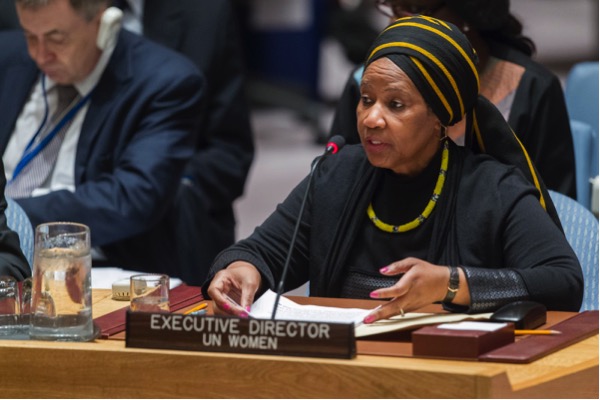Introducing Chapter 5 of the Global Study: Towards an Era of Transformative Justice
By Nela Abey

Phumzile Mlambo-Ngcuka, Executive Director of UN Women, addresses the Security Council meeting on the situation in Liberia in March 2016. (Photo: United Nations)
Chapter five of the Global Study on the implementation of UNSCR 1325 addresses transformative justice; that is, the provision of justice that focuses not just on particular violations but also underlying inequalities that women and girls face in conflict, which leaves them vulnerable to human rights violations.
The chapter demonstrates that there must be a focus on reparations for victims equal to the focus given to perpetrators in courts on inquiry. However, informal justice systems that aim at delivering equal rights for women and girls remains under-serviced and under-resourced.
Facts and Figures:
- Women tend to be less informed and report lower levels of access to both formal and traditional justice mechanisms than men;
- Charges for gender-based crimes have been brought in 6 of the 9 situations under investigation by the ICC, and in 14 out of 19 cases. But in the three verdicts issued so far, there have been no convictions for gender-based crimes;
- Increasing the number of women judges and other front-line justice officials can create more conducive environments for women in courts, and make a difference to outcomes in sexual violence cases.
Key recommendations:
- Adopt a transformative justice approach when programming for women’s access to justice;
- Invest in strengthening national justice systems to investigate and prosecute international crimes, including Sexual and Gender-Based Violence;
- Integrate a gender perspective in all steps of the work of a Commission of Inquiry/Fact Finding Mission including preparation, investigation, analysis and reporting; and
- Support increasing the participation of women at all levels in justice service delivery, through measures that can include quotas and support to women’s legal education.
For more information, see UN Women’s Global Study Factsheets or the entire Global Study on Women, Peace and Security.
